Dixie Hale was an Irish wing-half who initially played with his three brothers at home-town Waterford.
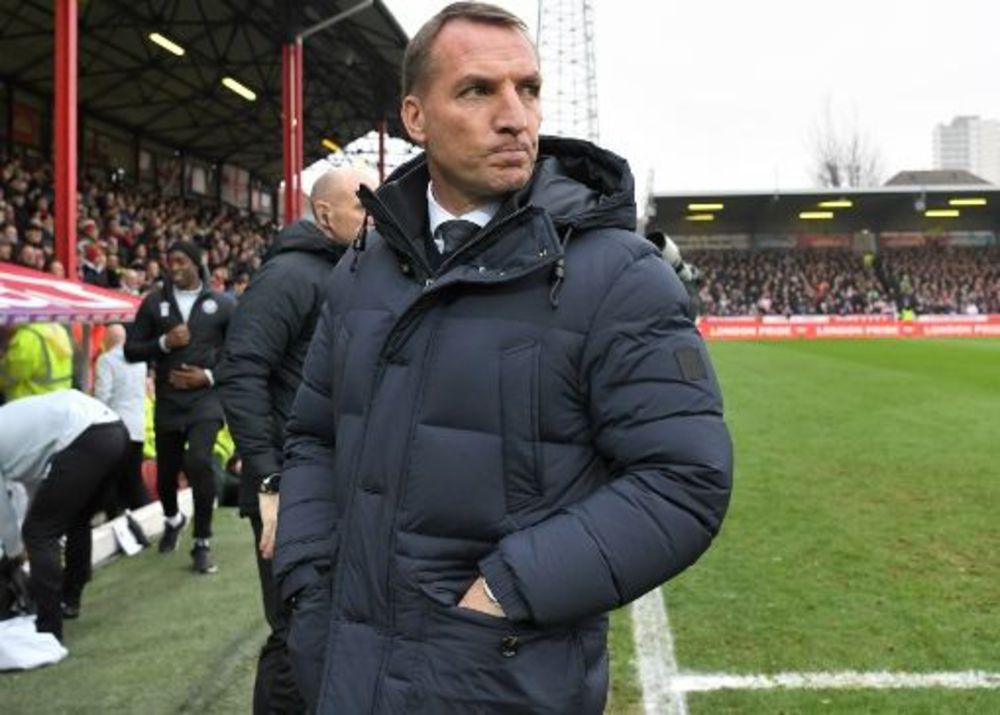
Frank George
He also played for Shamrock Rovers and Cork Hibernians, representing the League of Ireland before moving to Swansea in August 1959.
He netted 3 goals in 34 League games for the Swans prior to joining Barrow in July 1961, then moved to Workington in August 1964.
Following manager Ken Furphy to Watford in July 1967 for a £3,000 fee, he helped them win the Third Division title in 1968/69 as captain at the age of 33.
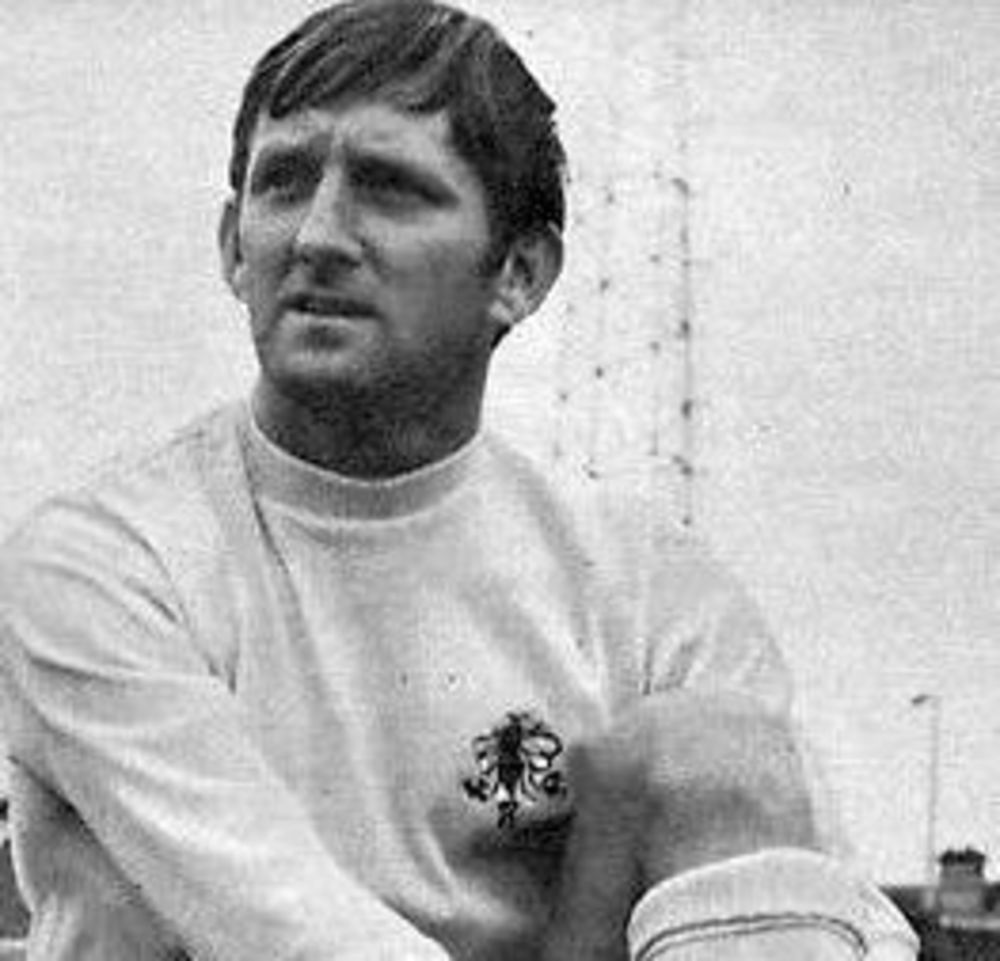
In September 1970 he signed for Southern League Premier Division King`s Lynn and then joined Southern Division One North side Wealdstone, where he enjoyed a couple of happy seasons.
The Stones didn`t want to lose him but the popular midfielder was taking a job back in South Wales and the club had no option but to release him from his contract.
Once back in Wales, Hale (pictured) signed for Pembroke Borough and went on to manage Pontardawe, Pembroke and Milford United in the Welsh League.
Andy Kirkup started his playing days with Corby Town in the Southern Premier Division, before spending a couple of seasons with Southern Midland Division neighbours Wellingborough Town in the late 1980s.
He joined the Doughboys` league rivals Rushden Town and was one of a number of players to transfer to the new club in the summer of 1992.
Playing mainly as a winger, he was very much a utility player and he made his debut for the new Rushden & Diamonds club in their first FA Cup game defeat, at Hednesford Town.
He scored the first Diamonds hat-trick – against Evesham United, as he broke his duck in the league for the club.
He worked as a warehouse manager and remained with the club as they gained promotion into the Conference via the Southern League Premier Division.
During the first season in the Conference, however, his opportunities were limited to just 7 substitute appearances and an offer of £4,500 from Gloucester City in October 1996 was accepted.
He spent just a single season at Gloucester making 25 appearances for them, before moving back to Northamptonshire with Southern Premier Division rivals Rothwell Town in July 1997.
He captained the Bones before he moved to Southern Midland Division neighbours Raunds Town at the start of the following season.
He moved Nuneaton Borough in December 1998 but was released in May 1999 and joined Cambridge City briefly before returning to Rothwell.
He had another spell at Cambridge City, where he took up the role of caretaker manager before becoming assistant to David Batch, but both were dismissed in December 2002.
He then retired from the football scene.
Chris Honor was a former Bristol City apprentice who turned professional in June 1986 and was a member of their 1989/90 Third Division promotion-winning squad.
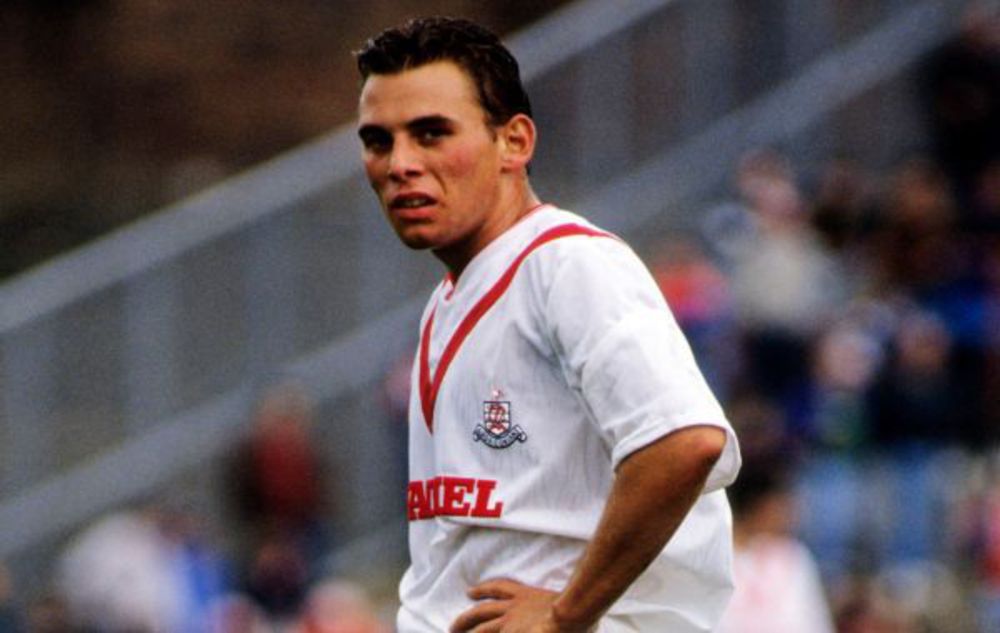
He had loan spells at Torquay and Hereford United before being loaned to Swansea City in January 1991.
After making 60 appearances for Bristol City, he was sold to Airdrie for £20,000 in August 1991 and featured in the 1992 Scottish Cup final.
He was loaned to Cardiff City before returning south of the border in 1995 after totalling just under 100 games for Airdrie and 10 for Cardiff.
In October 1995, Honor joined Conference side Slough Town but made just 14 appearances in his three months with the Rebels before signing for rivals Bath City in September 1996.
Honor (pictured) had a brief return to Scotland on a short trial basis with Partick Thistle but returned after playing just 2 games for the Jags.
He signed for Southern Premier Division Forest Green Rovers in October 1997 and helped them to win the title and promotion to the Conference and then played in the 1999 FA Trophy Final against Kingstonian.
He then re-joined a now Southern Premier outfit Bath in the summer of 2000.
Honor played his last game for City after suffering a cruciate ligament damage in his right knee.
It seemed almost inevitable from birth that Ted Hankey should take up football as a career, as he was born at Hanley, Stoke, within a stone’s throw of the Port Vale football ground.
At an early age he was representing his school in the Stoke & District Schools’ football and played with and against the great Stanley Matthews.
At the age of 17, he joined the Army and had the very unusual experience of keeping goal for the Army and on `off-duty` days playing centre-forward for Camberley & Yorktown in the Surrey Senior League before spending 1935/36 on Charlton Athletic`s books without making a senior appearance.
Whilst in the services, he represented the Army for three years against France, Belgium and all the leading counties of this country. He was a member of the 10th Field Brigade who were the winners of the Army Cup in 1935/36.
On leaving the Army in 1937, he was signed by Southend United, with whom he played 130 times until joining Southern League side Tonbridge in August 1950.
Roger Swift played for Bath City for 12 seasons in the Southern League from 1963 (pictured back row, second from left in the Bath squad of the time).
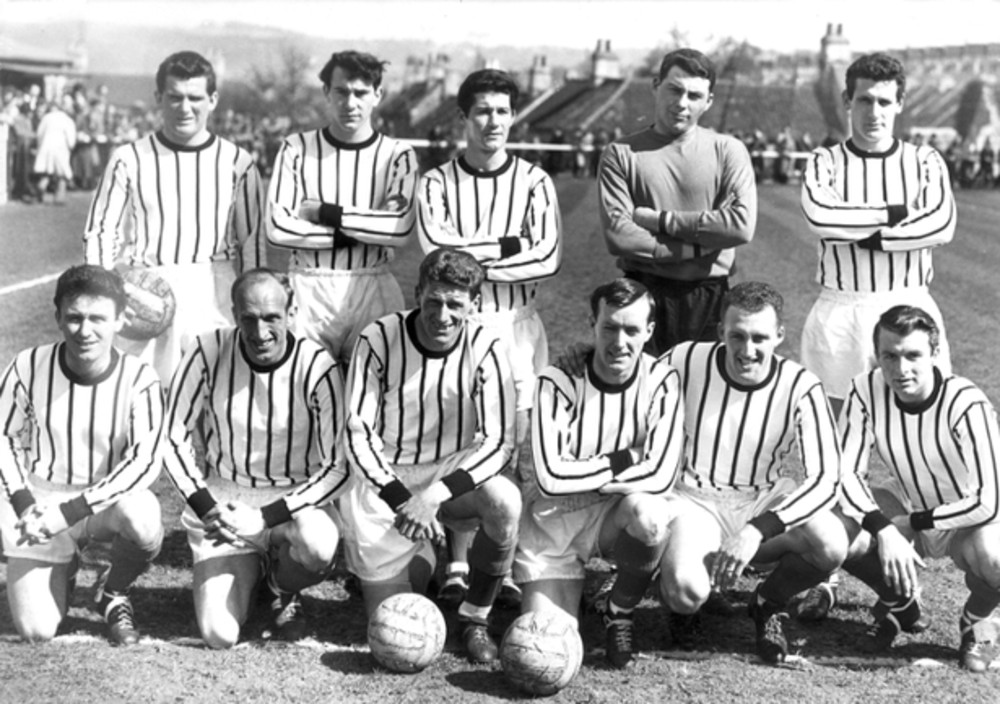
He first signed for the club at the age of 15 and following his first team debut in March 1963 he went on to play over 300 times, scoring his only goal in his 199th appearance.
His career was nearly ended in the early 1970s by a serious back injury but he overcame this to play for a couple more seasons and was awarded a testimonial by the club in 1973 when the opponents were Bournemouth.
Later that same year, after 12 seasons with the club, he joined Southern Division One South side Trowbridge Town.
He died in October 2019 at the age of 74.
Glenn Beech belied his frail frame to carve out a long and successful career for himself in non-League football.
The silky skilled midfielder started out as a youth at Aston Villa, before moving to United Counties League side Stamford.
He played in the FA Vase Final at Wembley in 1984 and then had spells with another UCL side, Baker Perkins and then stepped up to the Southern League Midland Division with Rushden Town and Grantham Town, where he scored 32 goals in the 1987/88 season.
That earned him a step up two levels to join Conference side Boston United in the summer of 1988.
He made 28 appearances and scored 5 goals for the Pilgrims before being signed by Peter Morris in February 1989 for rivals Kettering Town for a £10,000 fee.
The Poppies sold him back to Boston just 18 months later for half that fee.
He added a further 45 games to his Boston tally before re-joining Stamford late in 1991.
In August 1992, he signed for the newly formed Rushden & Diamonds prior to their first game in the Southern League Midland Division.
He became a regular in the Diamonds midfield during their push for the Midland Division title, apart from a long spell out of the team in late 1993 due to injury.
After two complete seasons with the Diamonds, helping them to win promotion, he was released and went on to play for Southern League South Division side Sudbury Town before joining Southern Premier Division Corby Town in December 1994.
He later had a spell back in the United Counties League with Spalding United before retiring from the game.
David Laws became something of a cult hero at Weymouth.
Laws was born in Sunderland and was signed by fellow north easterner Graham Carr in July 1995 for a fee of £9,000 from Northern League side Bishop Auckland – for whom he had scored 36 goals the previous season.
He had had trials for Wimbledon, Rotherham and Stockport – for whom he appeared in 1993/94 and had previously played for Murton Colliery Welfare for two seasons, finishing as top scorer in both campaigns.
At the time the fee was thought to be quite a high price to pay for a player joining a club playing in the lower levels of the Southern League. But those fears were soon answered, and he finished as top scorer in his first season with the club.
Laws went on to become of the most prolific goalscorers in the club’s history, scoring 219 goals in 383 appearances before signing for then-Wessex League side Eastleigh for £6,000 in August 2002.
However. Laws’ stay at Eastleigh was not to last the season as he returned to Weymouth in February 2003 on a free transfer.
There had been problems in his getting enough time off to attend training on a regular basis and the Spitfires decided that Laws was better off their books.
As well as playing Laws has been caretaker manager at the club, having been appointed in November 1997 and holding the role until the arrival of Fred Davies a few weeks later.
At the end of the 2002/03 season Laws left Weymouth again and signed for another Wessex League outfit, Portland United.
But the lure of returning to Southern League football with Dorchester Town was too strong for him.
Eventually, Laws announced his retirement from the game in September 2004, although he did return to play for Holt United later in the 2004/05 season and also made a single appearance on dual registration for the Terras in 2003/04 when he led the attack against Bath City in the Southern League Cup in January 2004 – and scored Weymouth’s first goal in a 2-0 win over the Somerset club.
Dan Ashworth began his career with Norwich City.
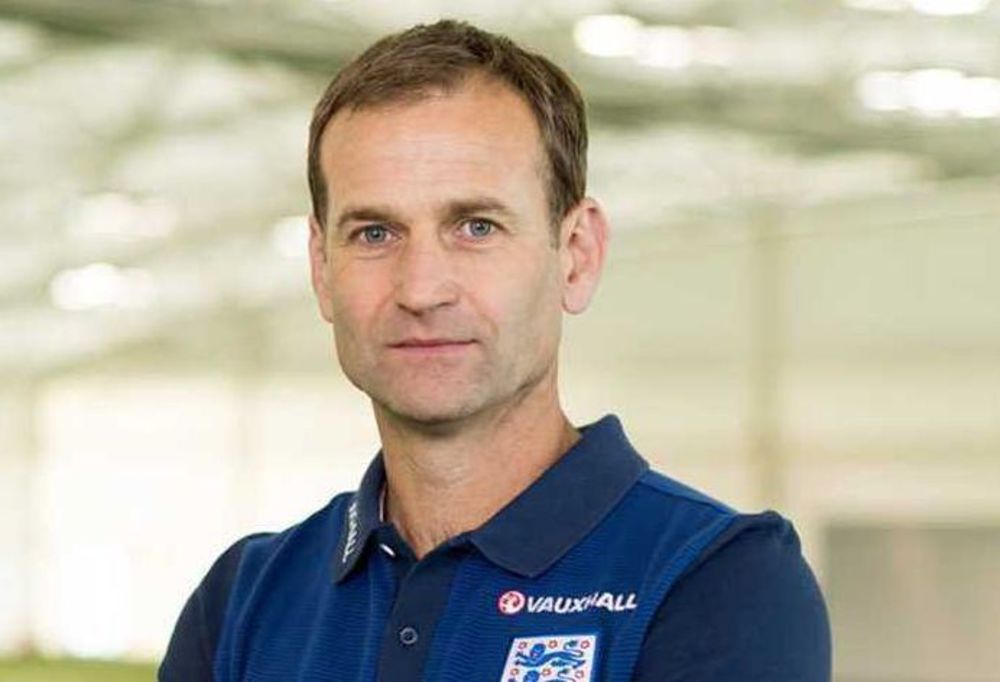
He later played for St Leonards in the Southern League and coached in the USA with the West Florida Fury before returning to East Anglia to sign for Southern Division One East side Wisbech Town
Wisbech's dire financial situation in the autumn of 2000 led to drastic wage cuts and Ashwoth left the Fenman along with five other players.
Having begun work at Peterborough United, Ashworth (pictured) was promoted from education and welfare officer to academy director at London Road following the Posh youngsters' poor start to the 2000/01 season.
He replaced Adie Boothroyd who was demoted to managing the 8-16-year-olds and opted to continue his playing career by signing for Eastern Counties League side Diss Town
Following Kit Carson's departure from Posh, Ashworth also left and joined rivals Cambridge United who ironically appointed Carson as head of youth development in November 2001.
In February 2004, Ashworth left Cambridge to assist Adie Boothroyd in setting up West Bromwich Albion's academy.
He was later appointed as technical director in December 2007. Ashworth had four departments for which he was responsible - the first team; recruitment, the academy, medical and sports science, with the logic being that if the manager goes, the new one is recruited into the existing framework — he does not bring in a whole new team.
Ashworth was regarded as one of the best in the business at scouting players and compiling information on them, including background checks.
Ashworth was influential in brining many continental stars to the Hawthorns and the list is also populated by players who were previously as anonymous as Ashworth himself, while even £4m on the likes of Peter Odemwingie and Somen Tchoyi hardly counts as lavish spending even at a club where the budget is notoriously tight.
He was appointed director of elite development for the FA in September 2012 and took up the new role in March 2013.
He is considered by many in the game to be at least partly responsible for England's significant upturn in results, particularly at age-group level and in women's football.
In September 2018, he left his role with England to become technical director at Brighton.
Mark Gayle was rated as one of best goalkeepers in non-League football during the early 2000s.
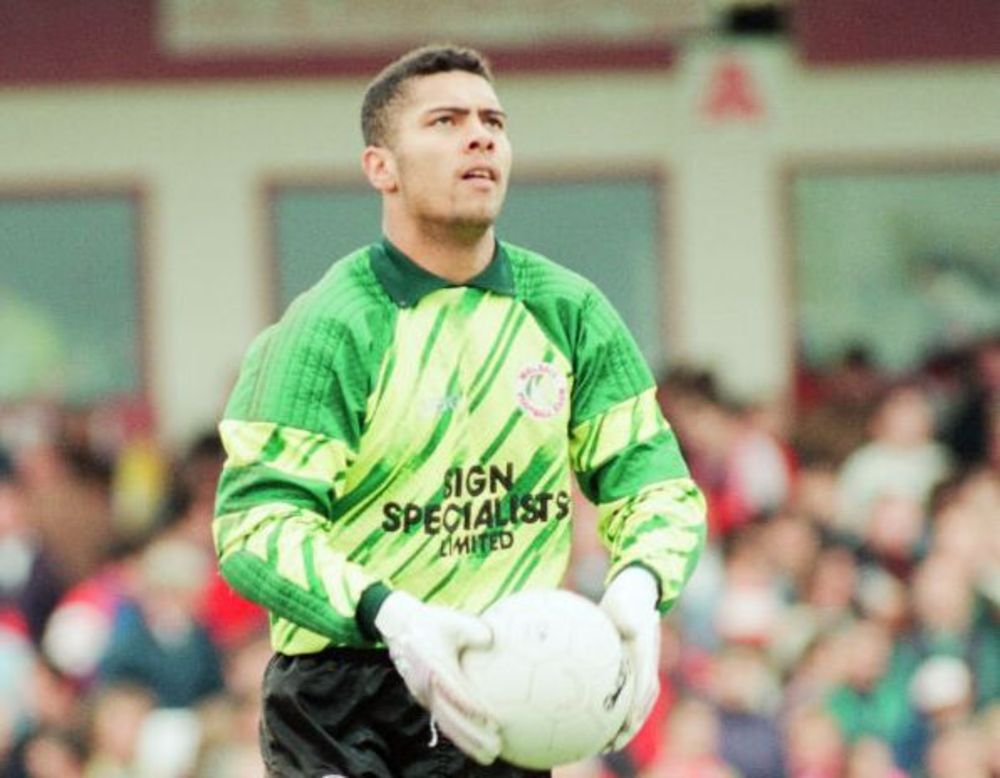
And he`s a classic example of someone dropping out of the professional game for a while to return a better player.
He began his career as a trainee with Leicester City before moving to Blackpool during the summer of 1989.
He made only one first-team appearances for the Seasiders before dropping out of the League and signing for Southern League Premier Division side Worcester City in August 1990.
After impressing in a friendly against Walsall, Gayle (pictured) made a return to the professional game with the Saddlers after one season with Worcester, who obtained a fee of £15,000 for his services.
During his two-and-a-half-years with Walsall, Gayle made almost 100 appearances, missing only one game between January 1992 and October 1993.
During December 1993 he transferred to Crewe Alexandra for a fee of £35,000 where he remained until the end of season 1997/98 and during that time playing over a century of games for the Railwaymen.
Whilst with Crewe, he was signed on a month`s loan by then-Liverpool manager Roy Evans during February 1994 in what at the time was an amazing move, featuring on the Anfield bench on three occasions in Premier League matches as back-up for England `keeper David James.
Similar loan spells with Birmingham City, Hereford United, Chesterfield and Luton Town followed prior to joining Conference outfit Rushden & Diamonds in August 1998, and made an impressive start to his Nene Park career, helping the team to seven straight wins at the start of the season, before an injury at Doncaster Rovers kept him out of the team.
On his recovery he struggled to get back into the side, picking up a further injury that kept him out of the team in the latter stage of the FA Cup run that culminated in two games against Leeds United.
He was then unable to regain his place back in the side, and he was released and joined Chesterfield in August 1999.
He was first-choice custodian during the Spireites` League Two relegation campaign before being released during the summer of 2000 and joining Hednesford Town.
He was named player of the year for 2000/01, despite the Pitmen`s wretched season that saw them relegated from the Conference and back into the Southern League.
After being released by Hednesford in October 2002, having played over 100 times for the club, he was snapped up by Solihull Borough, then in the Southern League Division One West.
A transfer to Halesowen Town followed during the summer of 2003, prior to re-joining Solihull in October 2003, before returning to The Grove for a second spell with the Yeltz in March 2005.
A surprise move back into the Conference with Tamworth came in the summer of 2005, where he also acted as goalkeeper coach before re-joining Halesowen for a third time in May 2006.
In 2007, he joined then-Southern Division One Midlands side Rushall Olympic where he became player/goalkeeper coach.
In 2009, Gayle joined his former Halesowen boss Paul Holleran at Leamington as keeper coach.
Darren Bloodworth was a talented central defender who played for both Leicester City and his local side Peterborough United as a youngster.
He failed to break into the first team at Posh and turned out in the United Counties League for Holbeach United and Bourne Town before joining manager Peter Morris for the first time at Conference outfit Kettering Town.
His first spell with Southern League King`s Lynn then followed before he enjoyed a spell in Hong Kong, captaining Kuitan in the early 1990s, when he also represented the former British territory at international level.
He returned to England and re-united with Morris at Boston United before former Manchester United and England defender John Gidman took him back to King's Lynn in 1993.
He teamed up with Peter Morris once more when the former Ipswich and Norwich midfielder took over as boss at King`s Lynn in 1995.
He later played for Eastern Counties League side Fakenham Town before joining Southern League Division One East outfit Wisbech Town as manager.
But in April 2000, Bloodworth joined Cambridge United in a coaching role with the youth development scheme.
In late November 2000, he returned to King's Lynn to help Tony Spearing manage the struggling Linnets whilst also working as director of the College of West Anglia's football academy which was run in conjunction with King`s Lynn football club
Another spell looking after the Linnets began in November 2003 when he took on the caretaker role with Kevin Boon, following the sacking of Peter Morris.
Their role was made permanent in February 2004 as Lynn topped the Southern League Eastern Division - only to be beaten 3-1 by Tonbridge in the new pair`s first official match in charge.
Despite this initial setback, Lynn went on to win the Eastern Division title with a 2-0 win at Fisher Athletic on the final day of the season.
In early September 2004, Bloodworth and Boon quit as managers of Lynn following abuse from fans, after a mixed start to the 2004/05 season, and a lack of support from Lynn's directors.
But after some Boardroom restructuring, both Bloodworth and Boon returned to Lynn in mid-October with Bloodworth taking on a director's role.
In May 2005, Bloodworth decided to leave Lynn for good, taking up a coaching role in the USA.
He returned to England in November 2005 and re-joined Cambridge United as youth team manager replacing Luke Hobbs, who has quit to join Southend United.
In June 2006, Norwich City announced that Bloodworth had returned to Carrow Road as education officer. The following year, his role was expanded to provide coaching support for academy manager Ricky Martin.
Bloodworth left Norwich in May 2008 to pursue opportunities closer to his home in King`s Lynn. However, by August 2008, he was back with City as education officer and under-14 coach.
In 2010/11, he took charge of the under-12 squad.
Frank George was a goalkeeper who started his playing days with Corinthian League side Carshalton Athletic.
In July 1954, he was signed by Third Division South club Leyton Orient and went on to play in over 100 games for the Brisbane Road outfit, helping them to promotion to the Second Division as champions in 1956/57.
In the summer of 1963, George was transferred to Third Division Watford but spent the whole of his first season at Vicarage Road as understudy to the emerging Pat Jennings who was, of course, to become one of the best keepers of all time.
Of the 10 first-team appearances which he did eventually make, only one ended in defeat, but it was nor ordinary defeat – Reading hitting six goals past him!
He was released by Watford at the end of the 1964/65 season and he signed for Southern League Premier Division side Worcester City.
He left in 1967 following City`s relegation to Division One when he was replaced by former Wolves, Leicester City and Plymouth Argyle keeper Dave MacLaren.
George later worked as a delivery driver for a print finishing company, but a car accident forced him into retirement.
John Bird was a left-back who came through the junior ranks at the `old` Newport County club and won honours for Wales Schoolboys.
He made his senior debut as a 16-year-old after signing professional forms in November 1957 and remained a first team regular at Somerton Park for ten years, making almost 300 appearances and scoring 4 goals and winning a Welsh Cup winner`s medal in 1963.
In July 1967, he joined Fourth Division Swansea Town, following manager Billy Lucas from Newport.
He contested a first-team slot with Vic Gomersall whilst at Swansea but made only 8 Fourth Division appearances for Swansea
He then joined John Charles' Southern League Premier Division Hereford United in July 1968.
He just missed the Bulls` FA Cup glories as he followed Welsh legend Charles to another Southern Premier outfit in Merthyr Tydfil.
Bird subsequently had a spell in the Welsh Leagues with Caerau and Pontyclun, where he was player-manager.
The recent managerial career of Brendan Rodgers is well-known, the current Leicester City boss having had success at Swansea City, Liverpool, Celtic and now with the Foxes.
But few know he spent a few years of an injury-shortened playing career in the Southern League.
He started out in his home Northern Ireland with Ballymena United and, interestingly, won Northern Ireland and Republic of Ireland Schools honours before being signed by Reading when he turned 18 in 1987.
However, without managing a senior appearance for the Royals, a genetic knee condition forced him to retire at age 20.
He remained at Reading as a coach and then academy director, whilst continuing to play non-League football, firstly with Southern League South Division side Newport (IoW).
The Isle of Wight side paid for Rodgers to travel from Reading and he enjoyed a decent couple of seasons at St George`s Park.
<8>He also spent two months on loan to another Southern League outfit, Witney Town, in 1994/95 under the management of Gary Ackling, who had that season taken over from Andy Lyne.
Ackling then took Rodgers with him when he managed Isthmian League First Division side Newbury Town during their last campaign before they folded.
After that, Rodgers concentrated on his coaching and managerial career which has been well documented. However, he hasn`t forgotten his non-League past and has kept in touch with several of his former clubs and team-mates.

Most clubs are looking for volunteers. Find out more on the button below:
www.PitchingInVolunteers.co.ukAll the news and results in one place.
REGISTER